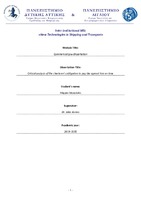| dc.description.abstract | Maritime industry constitutes a capital-intensive business which includes high value contracts. The fact that there are sizable time-lag effects for the construction of new vessels and also market sentiment effects, makes the booms and the recessions more intense.1 Considering that the rates of freight in the market is going up and down, it proves how the parties’ investment behavior within the maritime industry is affected. Many changes have occurred in the global economy during last decade and it is crucial to examine how vessel owners and charterers are influenced in regards to how they respond to such an unstable environment.
The obligation of paying hire of time charterparties constitutes one of the most significant charterers’ obligations against the vessel-owners. Hire functions as an exchange for the vessel-owners’ services within time charterparty and it also covers their expenses that arise in relation to the relevant services they provide. Thus, charterers’ failure to provide payment of hire can create problems in vessel-owners’ everyday financial operation, as well as to expose them to grievous cash flow problems.
The significance of the charterers’ obligation to provide hire payment along with their obligation to correspond to the vessel-owners’ entitlement to timeous hire payment, indicates the importance of available remedies in cases of charterers’ failure of payment. The vessel-owners need protection for their right to receive timeous hire payment and the charterers need clarity in a legal position where they have failed to provide hire payment. Therefore, it is crucial for both owners and charterers to have available remedies for such cases.
The English legal framework for the available remedies to the charterers’ where there is default in payment of hire in time charterparties can be characterized as dual. It should be noted that there are remedies available at common law along with contractual remedies available through contractual terms.
As described above, the maritime market includes high value contracts and hence any financial disputes between the parties can be proved intense. Within a buoyant market, vessel-owners may wish to get back their ships for fixing them at a better price. However, within a falling market, charterers might not be pleased with the existing hire rate and their wish is to either early redeliver or to negotiate again with the shipowners. An obvious example of the extent of the often-arising financial conflict of interests occurring between the charterers and the shipowners is the Baltic Dry Index fluctuation of 20082. BDI was more than 10 thousand in 2008, while in 2017, its range was between 1,109 and 1,296. It is possible for a charterer involved in a time-chartered bulk carrier which took place in 2008 and for ten years to be unwilling to pay the entire hire promptly or at all. Due to the collapse of the shipping market in 2008, there were many charterers who were locked in durable time charters. However, as they are parties of a charter party which binds them, charterers have to examine all the potential options before acting. When there is a dispute of paying hire promptly or at all, the vessel-owner is entitled to either lien the cargo3 or to terminate the service or to proceed to ship’s withdrawal.4
The question arising from the latest remedy is whether a shipowner would be entitled to claim damages for any upcoming losses. The recent contrasting decisions of The Astra case5 and The Spar Shipping case6 confused the maritime industry, revealing the relevant legal gaps regarding the shipowner’s right on claiming damages for future losses in case of a hire payment dispute. In The Astra case7, the court stated that the charterer’s obligation to pay hire constitutes a condition of the contract and enables the shipowner to recover any future losses automatically, while in The Spar Shipping8 case, the court decided that the obligation to pay hire constitutes an innominate term, which restricts the shipowner’s ability to recover future losses.
The purpose of this dissertation is to present a critical analysis of the charterer’s obligation to continuously pay hire in time. It aims to clarify and to analyze any relevant gaps, by including relevant case law indications, along with legal and regulatory framework challenges and by examining the remedies available to both the charterer and the shipowner in a case of a hire payment dispute, along with the classification of the obligation to pay hire.
The research will examine the relevant aspects and gaps within the regulatory framework of the charterer’s obligation to pay hire. While quantitative methods are more appropriate in regard to the issues’ quantification through the application of numerical data and, or, statistics, such a large research sample does not look necessary at this point. Hence, for the purposes of this dissertation a qualitative methodology has been selected, providing an efficient way of analyzing and indicating the issues, opinions as well as the motivations of the involved parties. Secondary data along with qualitative information were gathered through relevant regulatory and case law. | el |


